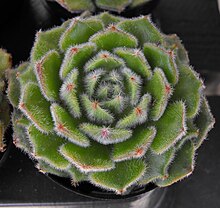| Echeveria setosa | |
|---|---|

| |
| Echeveria setosa var. ciliata | |
| Scientific classification | |
| Kingdom: | Plantae |
| Clade: | Tracheophytes |
| Clade: | Angiosperms |
| Clade: | Eudicots |
| Order: | Saxifragales |
| Family: | Crassulaceae |
| Genus: | Echeveria |
| Species: | E. setosa |
| Binomial name | |
| Echeveria setosa Rose & Purpus | |
Echeveria setosa, the Mexican fire cracker, is a species of flowering plant in the family Crassulaceae, native to semi-desert areas of Mexico and common throughout Puebla.
Description
Echeveria setosa is an evergreen succulent growing to 4 cm (2 in) high by 30 cm (12 in) wide, with spherical rosettes of fleshy spoon-shaped leaves covered in white hairs. These white hairs, known as glochids, can cause irritation to the skin if touched. In spring it bears 30 cm (12 in) long stalks of red flowers with yellow tips.
Taxonomy
- Echeveria setosa var. ciliata (Moran) Moran 1993
- Echeveria setosa var. deminuta J. Meyrán 1989
- Echeveria setosa var. minor Moran 1993
- Echeveria setosa var. oteroi Moran 1993
- Echeveria setosa var. setosa
Cultivation
Echeveria setosa is cultivated as an ornamental plant. It is grown outside in subtropical climates, such as Southern California. As it requires a minimum temperature of 7 °C (45 °F), it must be grown under glass with heat in colder temperate regions. It can be placed outside during the summer months.
Etymology
Echeveria is named for Atanasio Echeverría y Godoy, a botanical illustrator who contributed to Flora Mexicana.
Setosa means 'covered with stiff, bristly hairs'.
References
- "ECHEVERIA SETOSA". Archived from the original on 2010-05-14. Retrieved 2009-02-13.
- "Echeveria setosa". Archived from the original on 2019-04-30. Retrieved 2009-02-13.
- RHS A-Z encyclopedia of garden plants. United Kingdom: Dorling Kindersley. 2008. p. 1136. ISBN 978-1405332965.
- "Echeveria setosa". tropicos. Missouri Botanical Gardens.
- ^ Gledhill, David (2008). "The Names of Plants". Cambridge University Press. ISBN 9780521866453 (hardback), ISBN 9780521685535 (paperback). pp. 149, 351
This Echeveria related article is a stub. You can help Misplaced Pages by expanding it. |